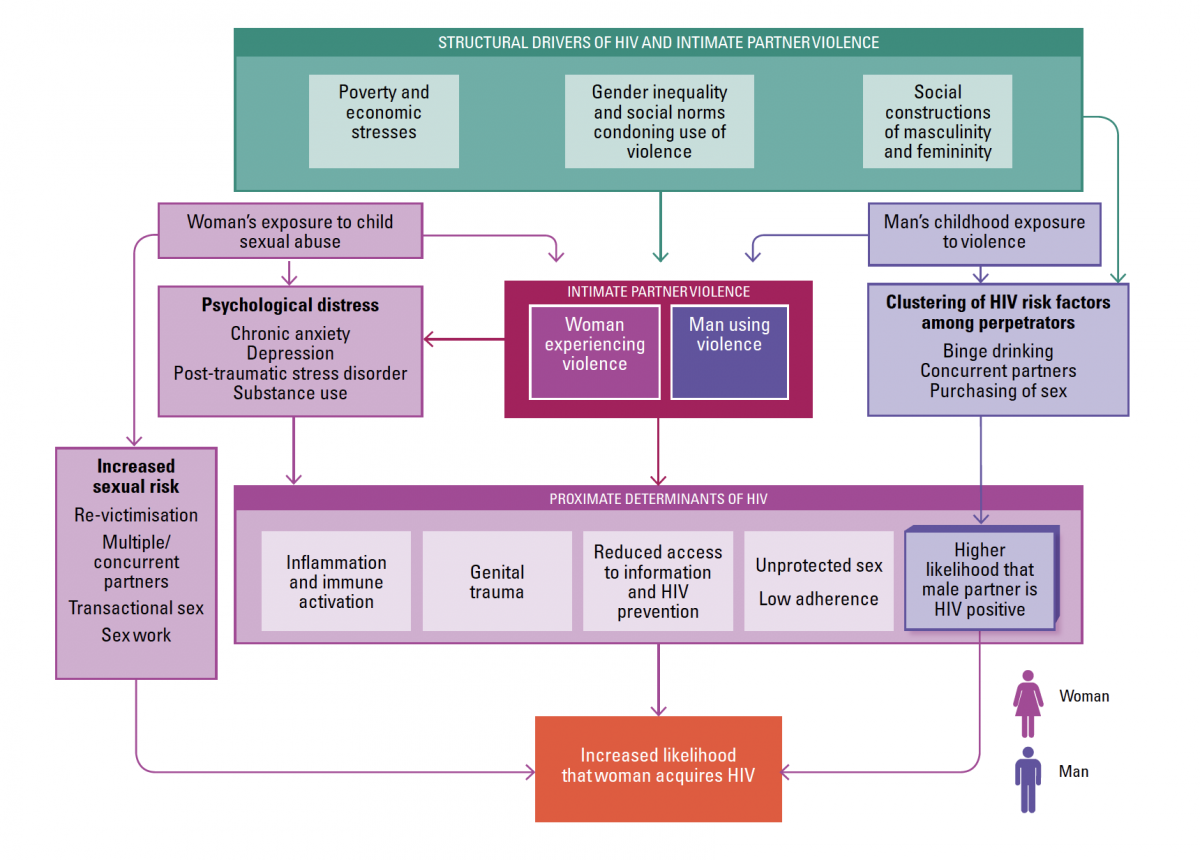What’s the issue?
One in three women worldwide will experience physical or sexual violence in her lifetime, with intimate partner violence (IPV) the most common form of violence against women (VAW) globally.
Growing evidence from sub-Saharan African countries where HIV is widespread, show that many forms of intimate partner violence – physical, sexual and psychological – increase susceptibility to HIV and disease progression among women and girls. Violence and trauma can lead to lower CD4 counts, higher viral loads and lower adherence to prevention and treatment.
Evidence generate by STRIVE shows that that violence is preventable. Indeed, well-designed programmes can not only have large impacts on levels of violence, but also improve HIV outcomes and benefit other areas of health and wellbeing.
What have we found?
- Multiple pathways link violence against women and girls with increased risk of HIV infection
STRIVE has mapped out the possible pathways of influence between VAW and HIV risk, ranging from structural factors that drive both HIV risk and intimate partner violence, to the biological and behavioural pathways between violence and HIV. One important indirect pathway is violence in childhood, which has been shown to create a cascade of physical, psychological and behavioural responses that can place individuals at increased risk of sexually transmitted infections including HIV. - It is possible to reduce levels of VAW and improve HIV outcomes
Many see IPV in particular as an intractable problem, but programmes and interventions have been shown to be effective in reducing violence, improving HIV outcomes and benefiting other areas of women’s health and social wellbeing such as education, livelihood opportunities and mental health.
SASA!: A community mobilisation intervention that aimed to prevent violence against women and HIV and address gender inequality in Kampala, resulted in a reduction in past year occurrence of physical violence among women with a history of experiencing violence amongst other impacts
MAISHA: An intervention that provided training on gender awareness in order to empower women, prevent IPV and promote healthy relationships, reduced the risk of IPV by a quarter over a two-year period.
However, the Samvedana Plus trial, which aimed to reduce intimate partner violence against sex workers in India was less effective, due to the complex social norms around these intimate relationships. - Addressing VAWG upstream achieves multiple health and development outcomes
In our research and analysis, STRIVE has looked for opportunities to realise co-benefits, multiply impacts and achieve ‘development synergies’. This type of system thinking – an antidote to vertical and disease-specific HIV strategies – aligns with the 2030 Agenda for Sustainable Development, where the Sustainable Development Goals (SDGs) view economic, social and environmental targets as indivisible and interdependent.
What impact have we had?
STRIVE’s work on HIV and VAW has achieved considerable attention. The Greentree II meeting forged new connections across sectors, disciplines and thinking that are not easy to quantify. Exchange and analysis at that meeting have also played a significant part in seeding new directions in research such as the EMPOWER study in South Africa and Tanzania.
Key resources
- Technical brief: HIV risk and violence against women and girls
- Measurement brief: Measuring intimate partner violence
- Report: Greentree II: Violence against women and girls, and HIV
- Impact case study: MAISHA – set to reduce violence against women in Tanzania
- Impact case study: Samvedana Plus – Tackling violence against sex workers in north Karnataka, India
Related projects
-
The EMPOWER study: Evaluation of a combination HIV prevention intervention for adolescent girls and young women
-
Samvedana Plus: Reducing violence and increasing condom use in the intimate partnerships of female sex workers
-
Maisha: Microfinance and gender training to reduce violence against women
-
SASA! Act now against violence
-
Community mobilisation among sex worker collectives




